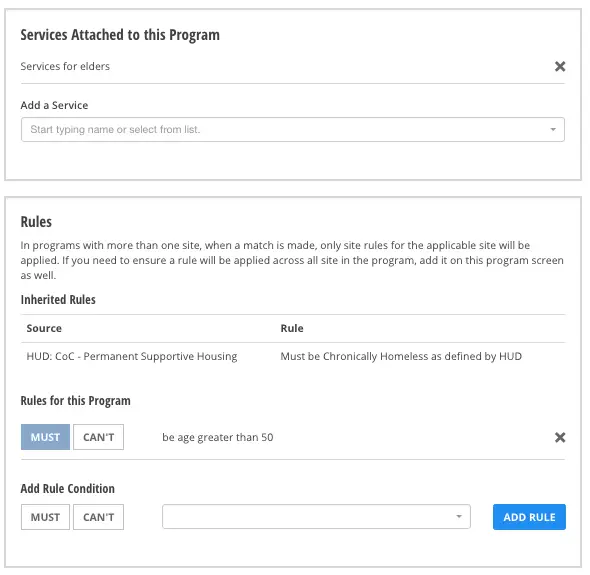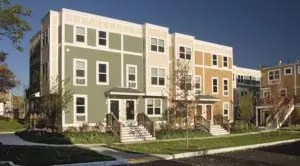Case Study
City of Boston's Coordinated Access System
An Engine for Housing Matches

Client
Under Mayor Marty J. Walsh, the Department of Neighborhood Development and others developed Boston’s Way Home: an interagency action plan to end chronic homelessness by 2018. With one of the most innovative IT departments in the United States, the City of Boston is committed to using technology as a key tool in ending chronic homelessness.
Goal
Leverage technology to make citywide “Coordinated Access” to housing services for homeless individuals an efficient, equitable process.
Outcomes
Software that brings together information from multiple housing organizations and service providers to get homeless individuals housed. Now in the open source under GPLv3 licensing, the Open Path CAS & HMIS is freely available for cities everywhere.
Overview
Open Path Coordinated Access System (CAS) brings together the organizations, housing resources, and services available to assist homeless people into a permanent home. It also orchestrates collective resources to serve those critically in need, prioritizing assistance for the most vulnerable. In a large community, finding housing is time-intensive and complicated, and information is often scattered across many organizations and systems. That can impose a significant bureaucratic tangle, and even undermine the very purpose of resources available.
In the case of Boston, city departments and non-profit service providers already had various database applications to track client and service information, including the federally mandated Homeless Management Information System (HMIS). They didn’t want to have to double-enter information in yet another place to handle Coordinated Access, but still needed a system to ensure no client or opportunity was overlooked.
Specifically, the Department of Neighborhood Development wanted to build a software platform to centralize, automate, and prioritize matching housing opportunities to homeless individuals using data that was already being collected.
Challenge
Coordinated Access is about coordination. What information is needed to match a client to a housing opportunity? Where is it stored? How can it be accessed? Which people – case workers, service administrators, city staff, a person ultimately being helped – need what specific information when?
Coordinated Access as a concept is relatively new, and designing an efficient supporting system involves more than inventorying current procedures. Ideas for best practices are rapidly evolving, and Boston, like many communities, is discovering which processes are most successful while simultaneously implementing the best technology to manage them.
For any system to exist across multiple agencies and departments, data integration must be seamless. Information must flow between systems (via CSV exchange files, API calls, SQL queries to database servers, etc), and merge together effectively. Relying only on SSN and birthdate, for example, to identify which records refer to the same person often yields inaccurate results.
The Open Path CAS enters this data landscape as an organizing and streamlining force.
Process
As in many communities, opportunities for affordable permanent housing in Boston are in short supply. When a vacancy arises, Coordinated Access needs to ensure the most needful person eligible, regardless of which service agency has been in recent contact, is offered a chance to accept it. Eligibility rules around specific opportunities can be complex, as programs, vouchers, and funding sources are often targeted at discrete populations. A system-suggested housing match must meet those restriction criteria while reflecting the ethos of Boston’s mission to prioritize the most vulnerable and be predictably successful.
We worked iteratively with the City of Boston staff and service providers responsible for housing decisions to make sure the system reflected their approach and met Fair Housing requirements. During development we reviewed wireframes and stepped through workflows as a group to find gaps and improve the process. And we used the collected data from multiple sources to build a system whose operating scope is not limited to any single organization.
A “slim” tool, case workers can interact with the Open Path CAS without ever having to log on – adding functionality to the housing process without disrupting existing systems. The Open Path CAS makes use of email notifications and expiring links to support reduced login requirements while maintaining compliance with HIPAA and other privacy rules.
Now available for free in the open source under the GNU General Public License, Boston advocates that cities and towns throughout the United States consider adopting the Open Path CAS to streamline and empower their respective Coordinated Access approaches to end homelessness.

The site supports the ability to modify key rules that govern person-to-housing match recommendations. Rules can be set on all elements in the system, e.g. buildings, units, funding sources, and services. The Open Path CAS facilitates complex human decision-making by providing details about why a match was suggested: which rules and which of the person’s characteristics and demographics led to the high confidence rating behind a given recommendation.
During the initial phase of use, Boston DND knew they would want to review all matches for a ‘sanity check’. We built this review in to the workflow such that it can be turned off once DND has established confidence in the software’s automated recommendations.
Solution
The Open Path CAS is rapidly becoming an essential tool within Boston. A way for the many people, agencies, data sources, and decision processes involved in Coordinated Access to coalesce and efficiently effect action: a way to prioritize assistance justly, to keep the myriad involved parties updated with information and prompt for action when required, and, ultimately, to successfully end the state of chronic homelessness.
The City of Boston followed through with their commitment to share their work, lessons, and investment. We maintain the Open Path CAS as an open source project, and by a decision of Boston’s that we greatly applaud, released it under the copyleft Gnu Public License. Anyone can therefore use the software, with the critical stipulation that all improvements made must be released to the public. As such, the system can truly serve a greater good.
Extending Impact
For communities who also wish to adopt the CAS, Green River has packaged the software into an open source platform, which we offer as a fully supported, hosted solution. Read about our open source Open Path HMIS Data Warehouse and CAS.
Green River
Case Studies

SOHA
Collecting and analyzing public housing and rental assistance data for the Commonwealth of Massachusetts.

Education Resource Strategies (ERS)
Improving urban school systems through the innovative orchestration of resources

Reach Out and Read
Advocating for childhood literacy

State of Delaware – My Healthy Community
Empowering residents and medical professionals with comprehensive, up-to-date, and actionable public health and COVID-19 data

Housing Navigator Massachusetts, Inc.
Simplifying the search for income restricted rental units in Massachusetts

Global Real Estate Sustainability Benchmarks (GRESB)
Transforming the real estate investment market in favor of sustainable performance